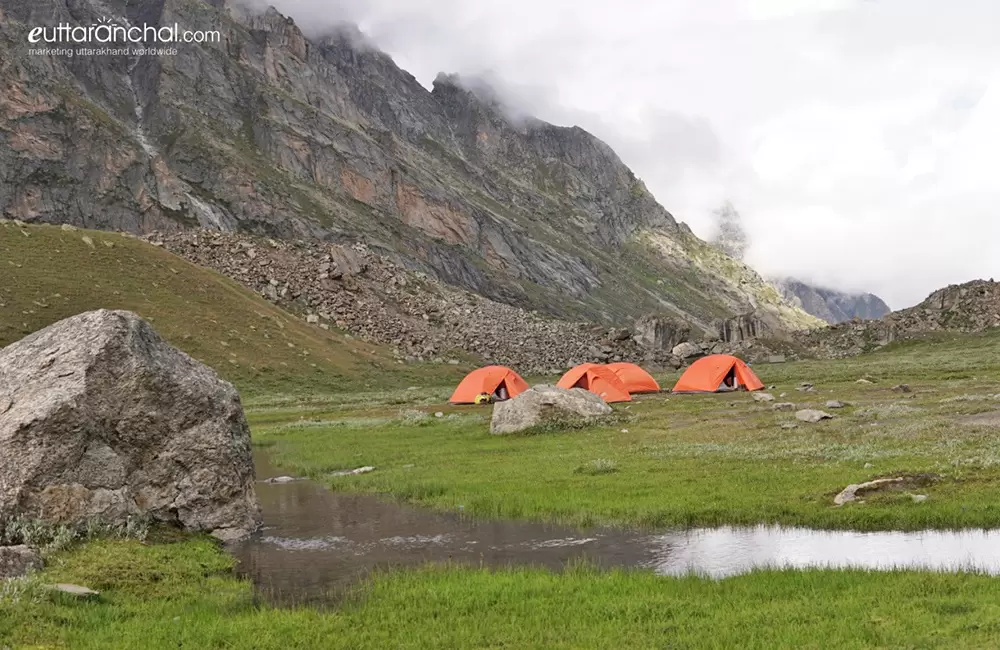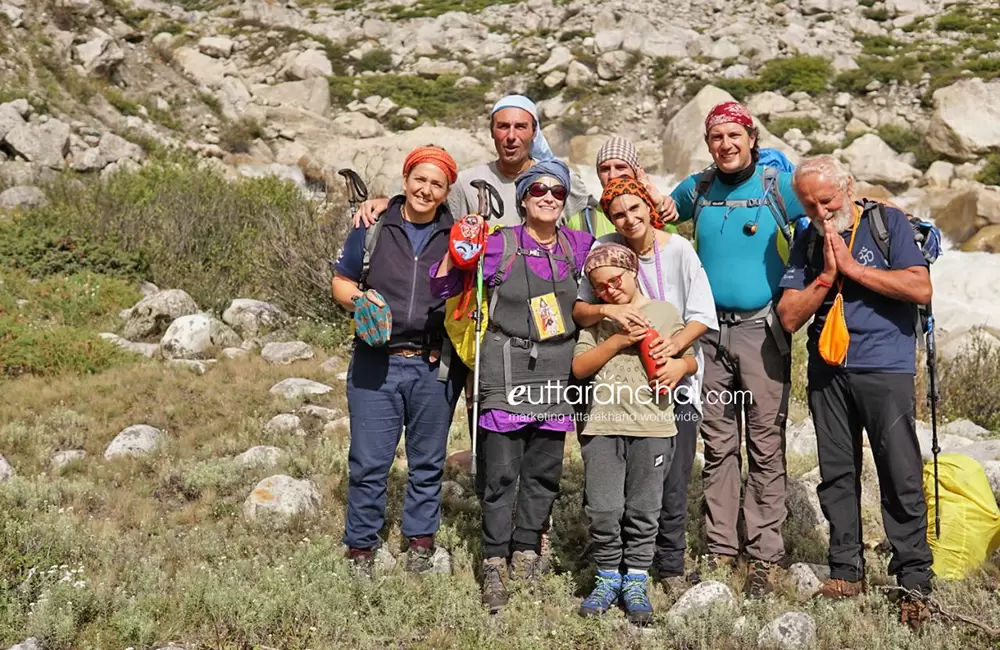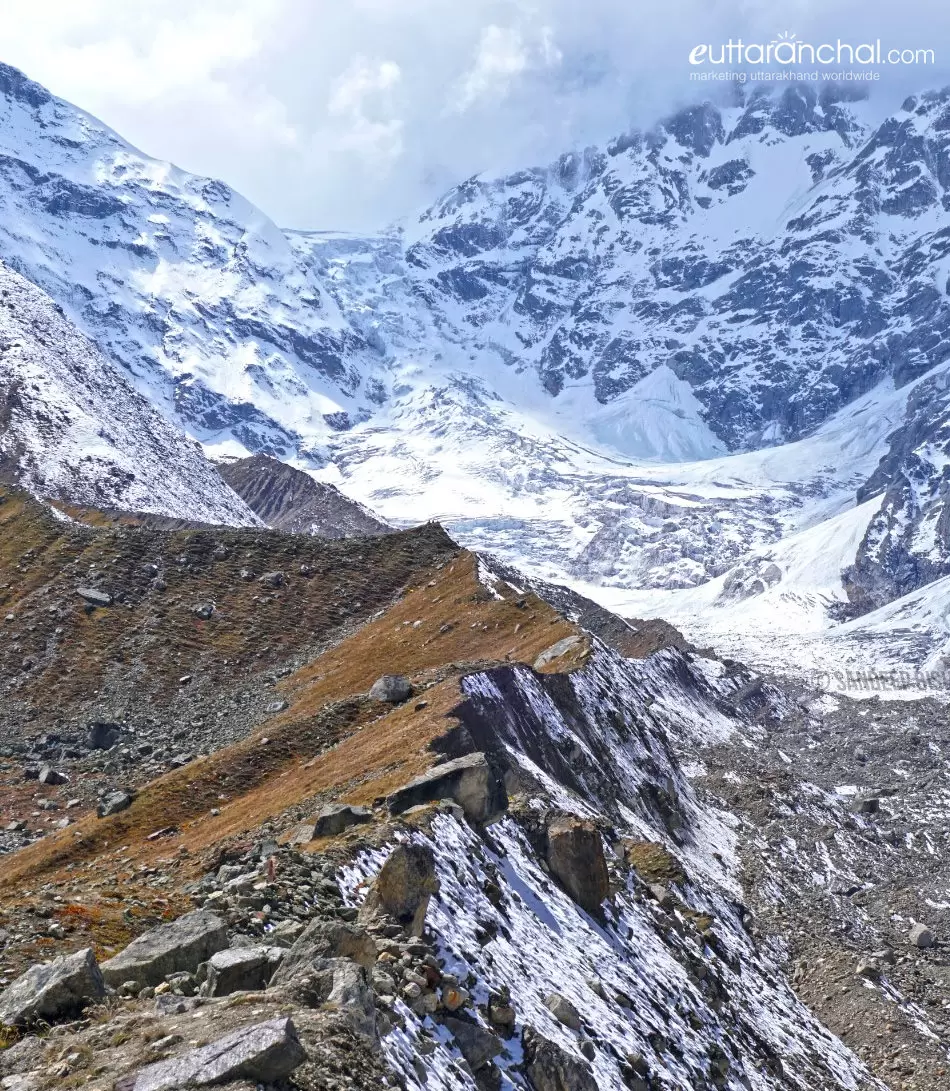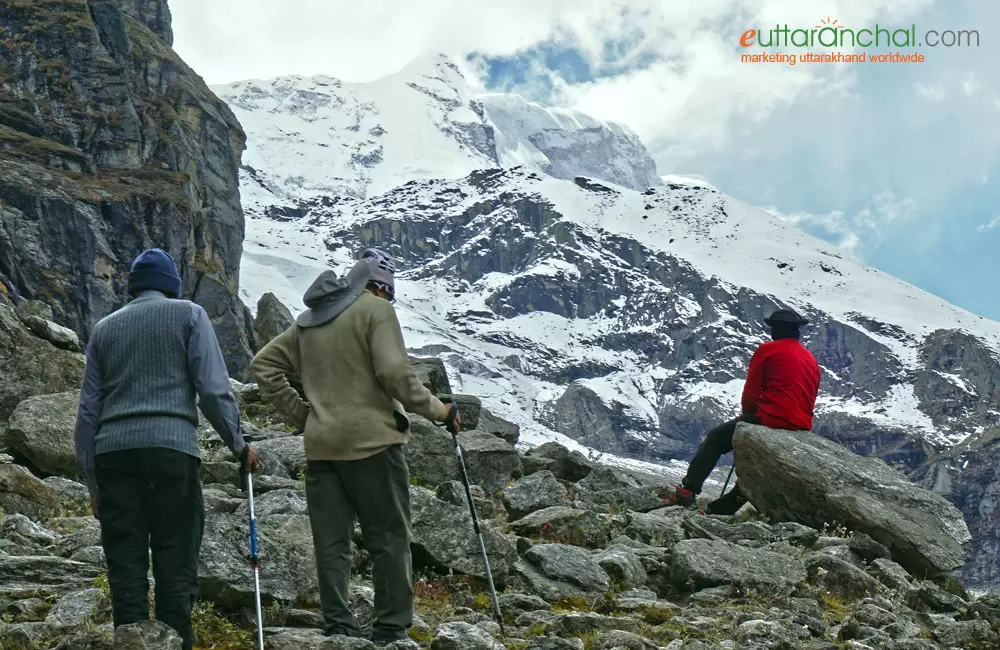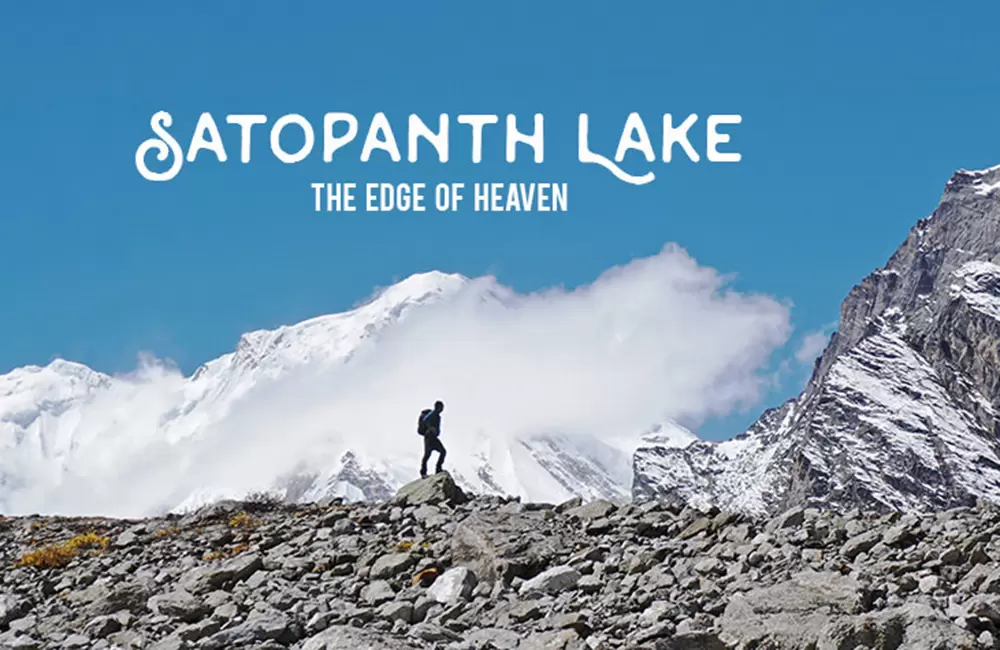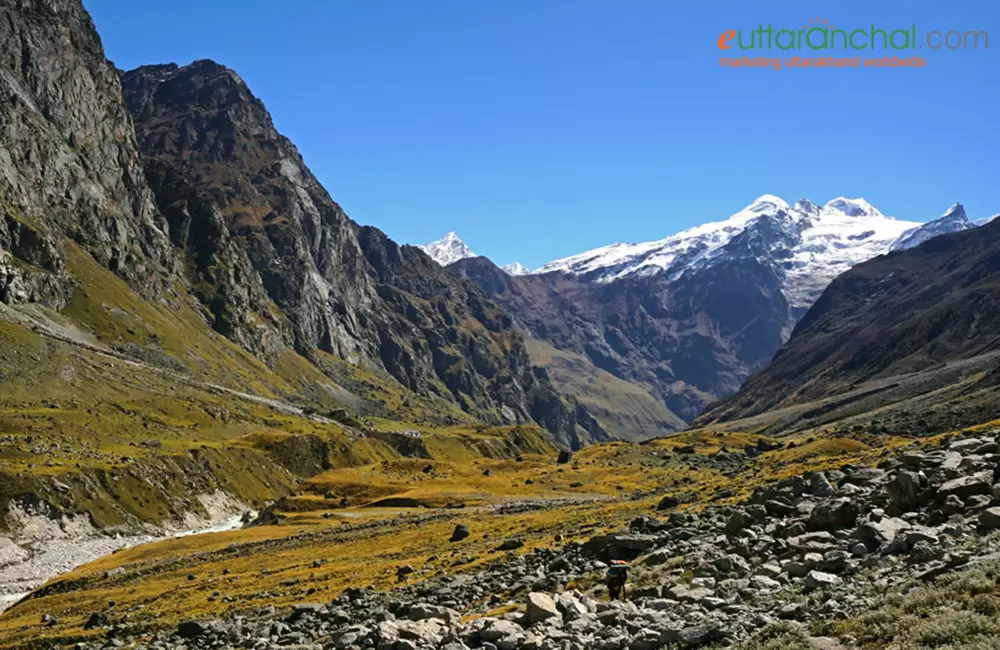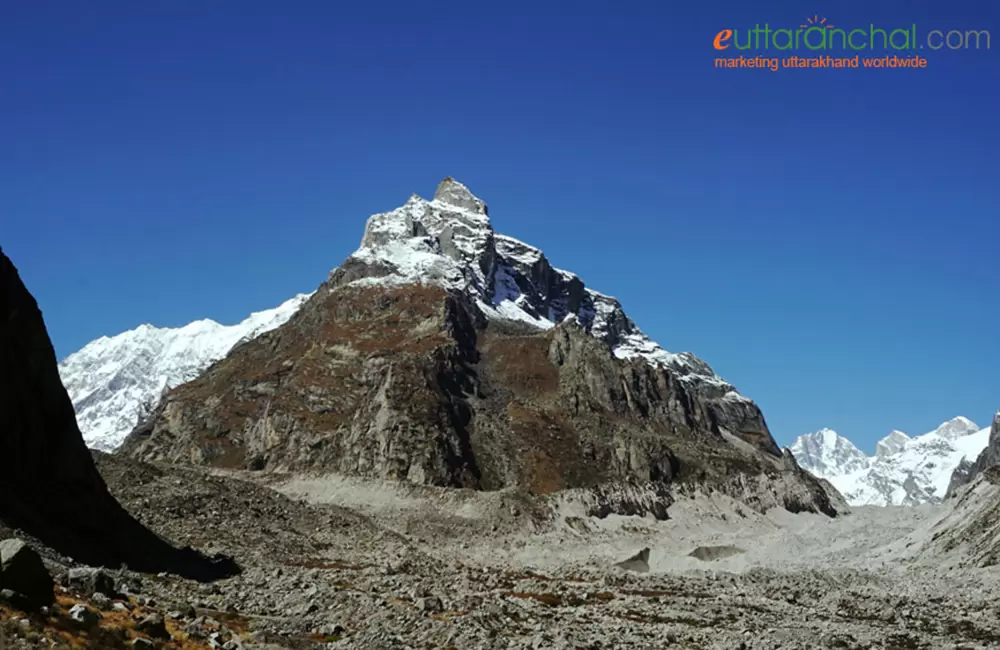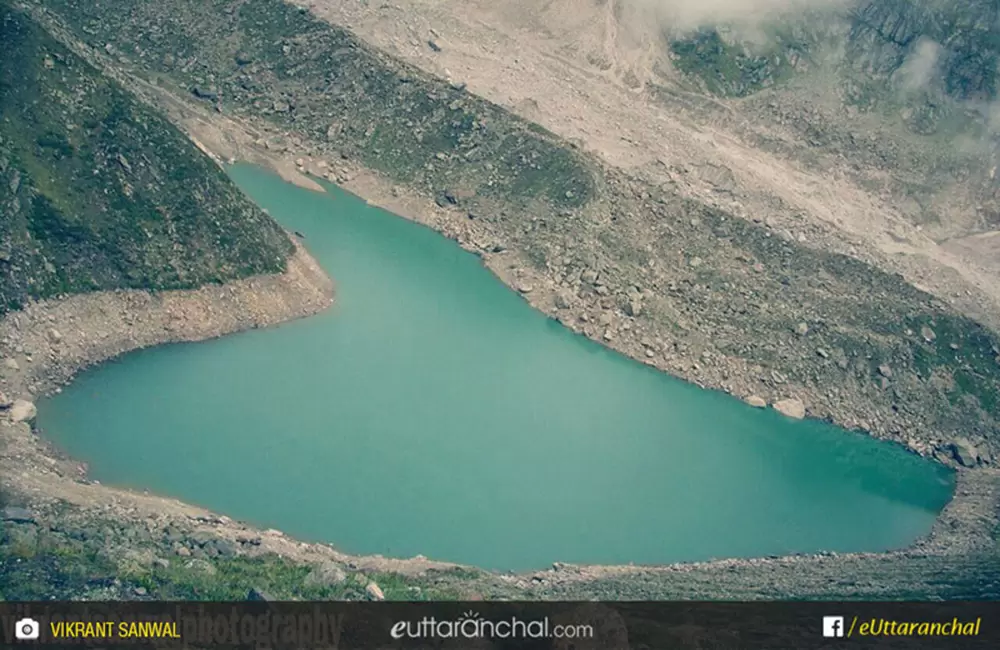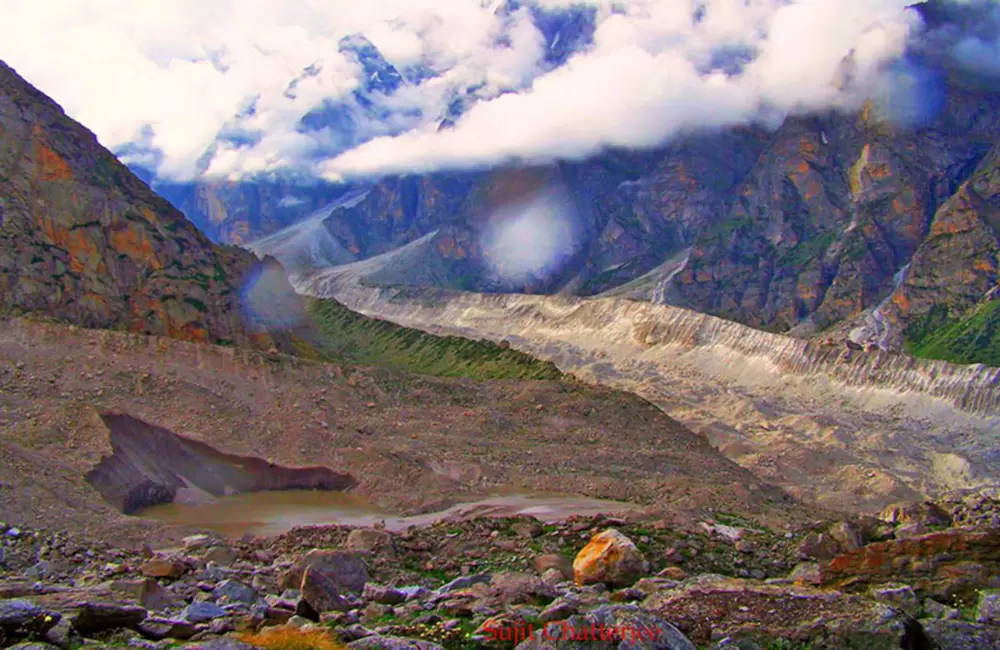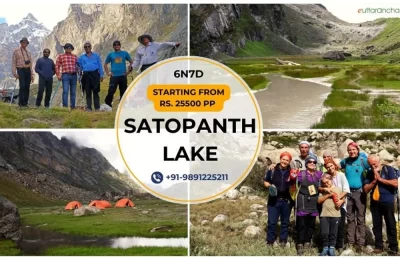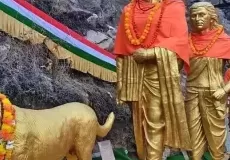Satopanth - Glacial Lake of Divinity
The pea-green Satopanth Lake is celebrated for its holiness and mysticism which tempts many avid travellers to gear up for commencing the Satopanth Tal trek. The virgin trail leading to Satopanth can be easily accessed by crossing Lakshmi Van and Chakratirtha. This rewarding trek will offer you unobstructed view of the snow crested Chaukhamba and many other peaks. You will have euphoric spiritual as well as mental bliss while reaching at this lake.
The trail to the lake rewards trekkers with abundant natural beauty in the form of snow-clad peaks, verdant hills covered with pine and oak trees, gushing rivulets and streams.
Best Suggested Itinerary for Satopanth Trek
Day 01: Rishikesh - Badrinath
Early morning catch the bus to Badrinath from Rishikesh and have lunch en-route. On reaching Badrinath, pay obeisance at the Badrinath temple and take the blessings of the deity. Check it at a hotel, have dinner and overnight stay.
Day 02: Badrinath - Lakshmi Van
Post breakfast, check out from the hotel and commence a short 3 km trek to Mana (you can take local taxi as well), the last village of India on the Indo-Tibetan border. After getting your permits checked, make your advancement towards the Vasundhara Falls. After crossing the Saraswati temple from Mana, the gradient of the trek will become steeper. Walk-in harmony with the mighty Alakananda River, flowing below.
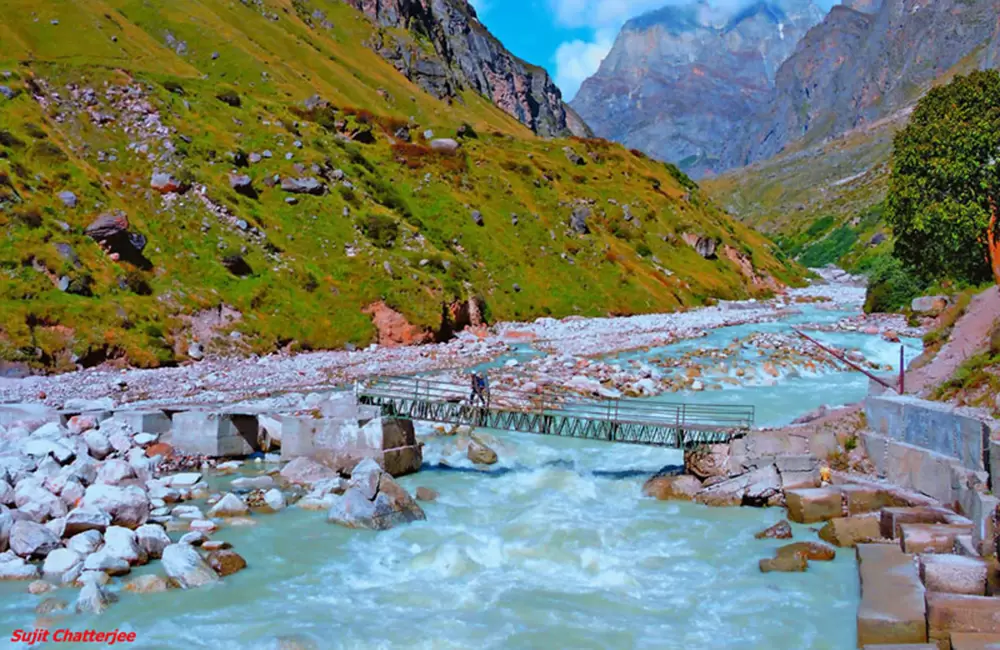
Sujit Chatterjee: Trail from Mana towards Satopanth
After a couple of hours, the surging sound of the water plunging from a height will suddenly hit your ears. On walking closer to the sound, the sight of Vasundhara Fall will come into your eyes. This cascading waterfall has medicinal properties and has been scientifically proved. Absorb the beauty of the waterfall and start treading through the thick birch forests of Laxmi Van. Walk 4 km further on the moraines and you’ll come across your campsite at Laxmi Van.
Day 03: Lamxi Van - Chakratirtha
Capture the beautiful sunrise view and gear up for today’s trek. This is a short yet scenic trek which will cross the Satopanth Valley. The well-marked trail is dotted with the green patches amidst the vast terminal moraines of Dhano Glacier.
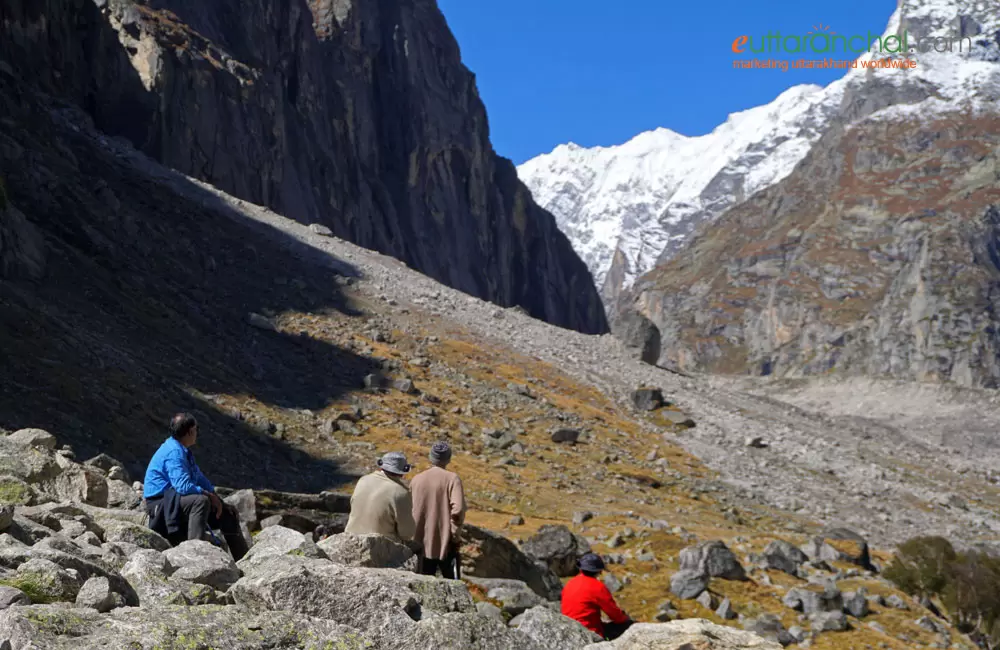
Rest point before entering Chakratirtha Valley
On the way, you can see the colourful alpine flowers blooming in the valley, after which the glorious view of the three benevolent peaks of Bhagirathi will first appear at the Satopanth Valley. Gradually climb the steep ridge of Sahastradhara to Chakratirtha camping grounds. On reaching the campsite, roll on the ground and gaze at the glaring west face of Mount Neelkanth.
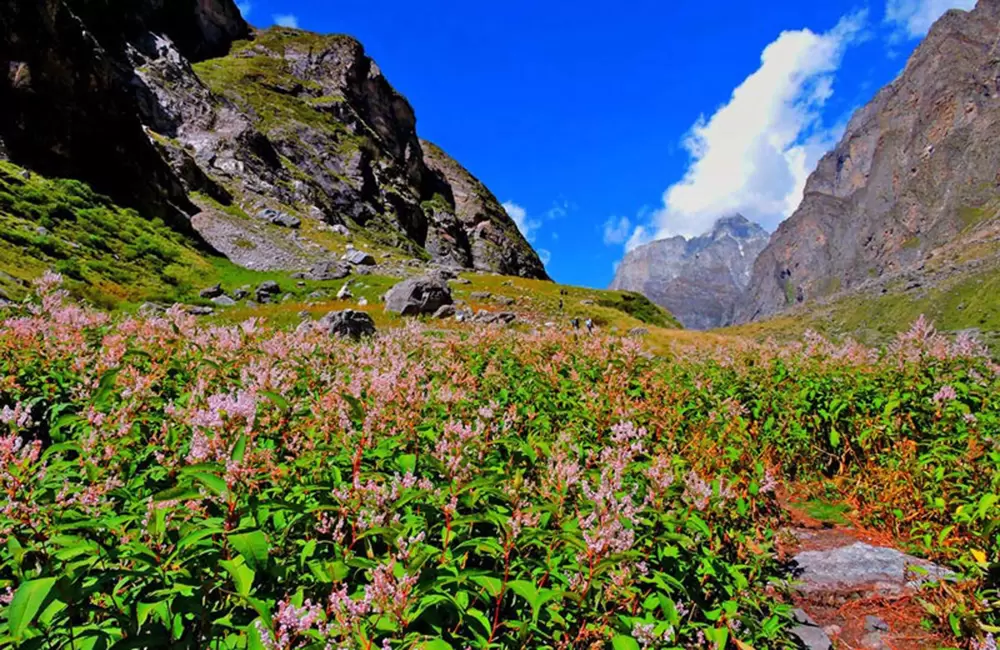
Sujit Chatterjee: En-route Laxmivan
Day 04: Chakratirtha - Satopanth - Chakratirtha
Unzip your tents early morning, to have a tempting view of Chaukhamba in the centre, Neelkanth, Satopanth and Parvati Peaks on your left and Balakun on your right. Sip a cup of tea, while getting drenched in the enigmatic aura of the colossal hills.
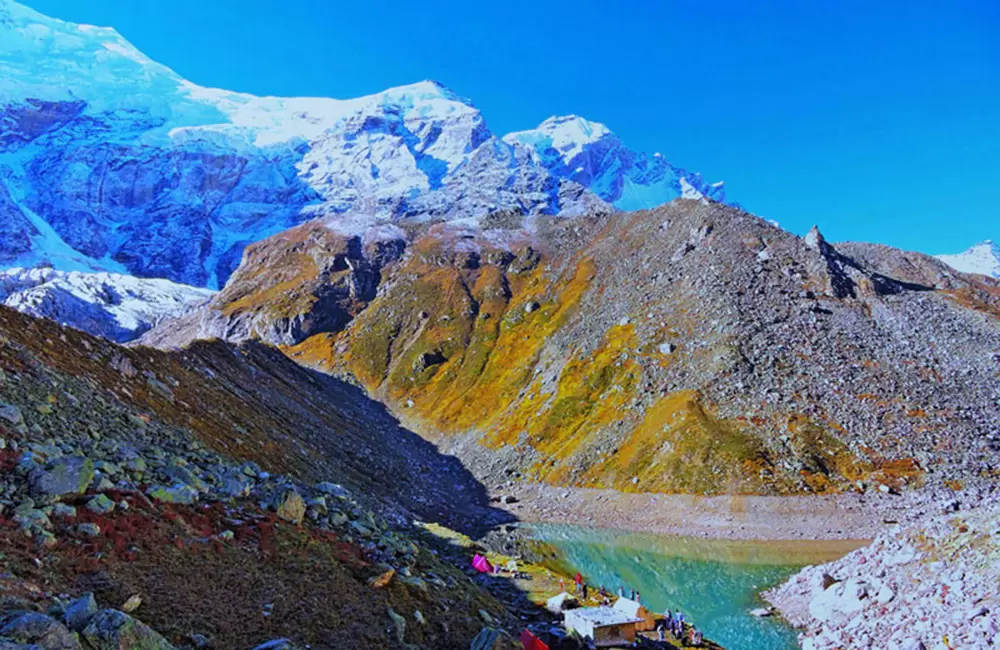
Sujit Chatterjee: First view of Satopanth Lake
Now get ready to meander through the puzzling maze of boulders and moraines. You may also hear the perpetual tumbling sound of the avalanches throughout the valley. This is a tricky stretch so be patient while crossing it. In the last 2 km trek, you may have to deal with a couple of steep slopes and walk over the loose soil scattered over the glacial moraines. On reaching the top of the ridge, you will see the first sight of the triangular shaped, Satopanth Lake.
The breath-taking views from the emerald lake will sweep you off your feet. You can also see a saint known as Mauni Baba who resides near the lake and has stopped talking from a very long time. There is a common belief that he can live on only sun and air if food is unavailable. After spending some time here, start descending to Chakratirtha campsite. The 5 km return trek to Chakratirtha can be completed in a couple of hours.
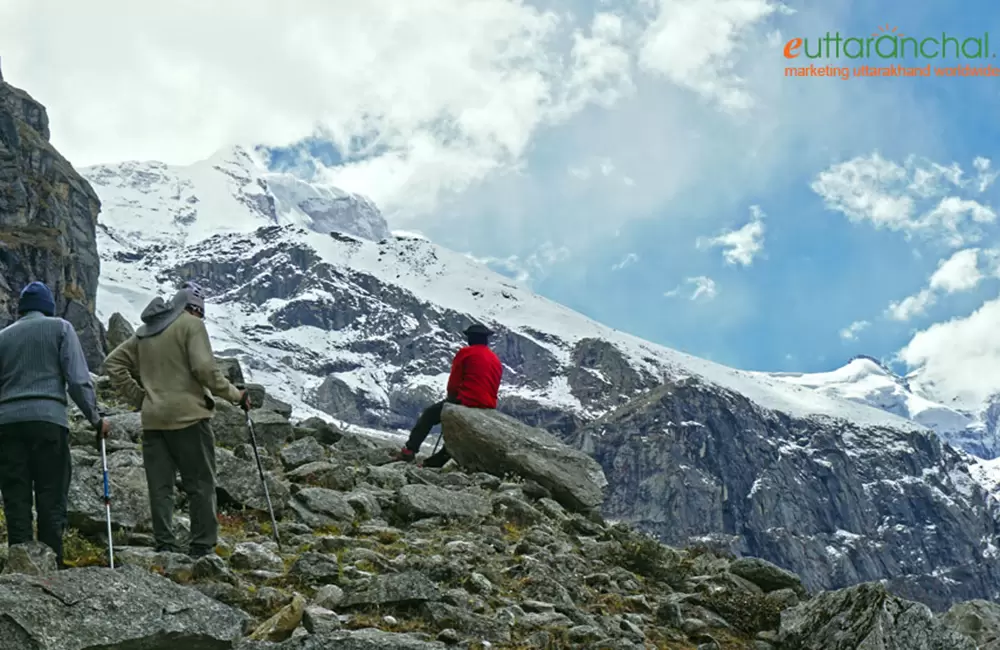
First Look of Parvati Peak during Satopanth Trek
Day 05: Chakratirtha - Mana - Badrinath
Wake up to the chirps of the playful birds, post breakfast pack your tent to start descending all the way down to Mana village. Follow the same trail that you took for reaching Chakratirtha from Mana. This 15 km trek can be completed in 5-6 hours. On reaching Mana, take the taxi ride to Badrinath, check in at a hotel and have an overnight stay there.
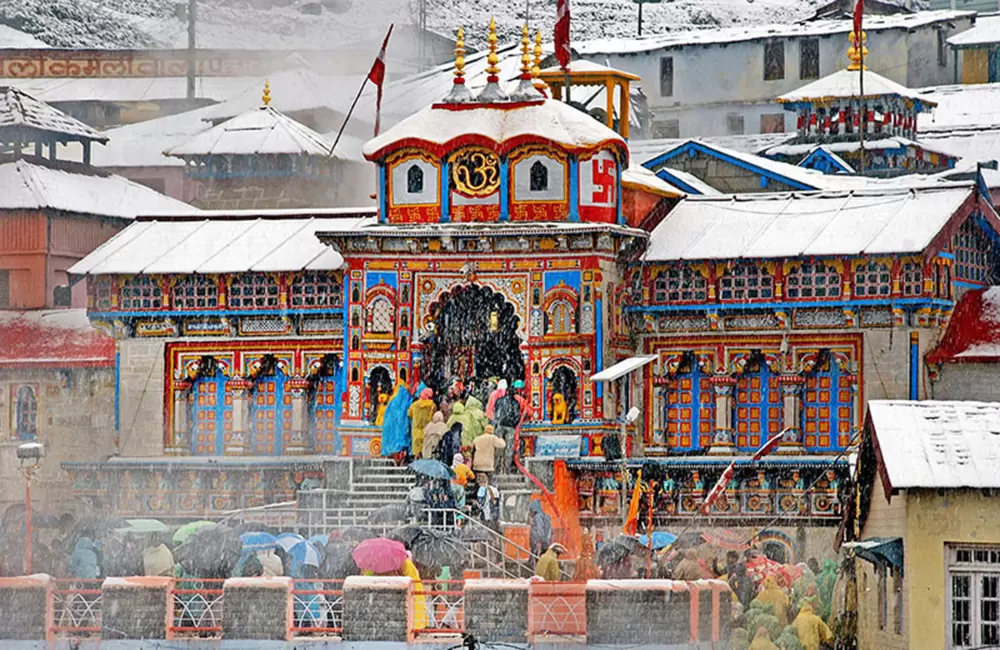
Sirsendu Gayen : Snow fall at Badrinath - Devotees are waiting for their turn to enter in the temple.
Day 06: Badrinath - Rishikesh
After having a nutritious and healthy breakfast, check out from the hotel and leave for Rishikesh.
You can also check our tours of Satopanth: Budget Trek to Satopanth ex-Badrinath :: Satopanth ex-Haridwar/Joshimath Deluxe Trek
Mythology about Satopanth Trek
According to the Hindu legends amd Mythology, the Tridevas or the three devas, Brahma, Vishnu and Mahesha (Shiva) mediated on the corners of this lake. It is believed that during every Ekadashi the trinities take a holy dip in the water of Satopanth Lake. The Hindus believe that taking a bath in the Saptopanth Lake on the 11th day of the solar and lunar fortnights is considered to be auspicious.
Locals also believe that some special type of birds are found here, which pick up the pollutants of the lake and thus keeping the lake clean. These birds are not found anywhere else. The local belief is that they are the Gandharvas perdue, who guards the lake against evils.
The Hindus believe that Goddess Lakshmi and her husband Narayan indulged in a penance at Lakshmi Van and Chakratirtha.
There is an interesting story behind the indent created at Chakratirtha which states that Narayan once kept his Sudarshana Chakra on the valley and due to its weight the valley got its round shaped meadow surrounding the lofty mountains.
About Satopanth Lake
With its emerald blue-green crystal clear waters the triangular lake, having a perimeter of 1 km is situated at an astounding height of 4400-4600 meters (15100 feet). Satopanth Lake is 25 km from Badrinath shrine and about 4 km from Chakrateerth. This pristine lake is situated on the base of legendary Neelkantha Peak. The travelers can relish the stunning views of the glorious Balakun Peak, Kuber Top, Mt. Nilkantha and Mt. Swargarohini which are visible en route.
There is a saint known as Moni Baba, who hasn’t uttered a single word from years. There is a common belief that he can live on sun and air if food is not available.
What is Meaning of Satopanth?
Satopanth word is derived from two words – ‘Sat-o’ meaning of truth, and ‘Panth’ meaning path or way. So its literal meaning is the path of truth.
Satopanth Lake has three corner and each corner of Satopanth Lake is named after divine Trinity of Brahma, Vishnu, and Mahesh. The lake considered sacred by the local people of Mana village, which is base camp village for Satopanth Lake.
About Satopanth Glacier and Bhagirathi-Kharak Glacier
The Satopanth and Bhagirath Kharak glaciers are located at the head of Alaknanda Valley in Chamoli district of Uttarakhand. Both Satopanth glacier (13 m) and Bhagirath Kharak glacier (18.5 m) have an average width of 750-850 metres.
These glaciers sprawl over an area of 21.17 and 31.17 square km respectively. The eastern slopes of Chaukhamba group of peaks feed the ice to these glaciers. The towering peaks raging from 5,288 to 7,068 metres are snow-clad during winters.
These two glaciers are separated by a linear ridge. Both the glaciers have a sinuous course as their paths are obstructed by a number of spurs. The ablation zones of both the glaciers are covered by a thick layer of debris and their snouts are located at 3858 m and 3796 m above sea level.
The Alaknanda River originates from Satopanth glacier and meets Uttar Ganga upstream to Alkapuri. At Mana, Alaknanda meets Saraswati River and there onwards it drains in the Badrinath basin. The enchanting Vasudhara Fall is located on the route of these glaciers.
Satopanth is also known or written as Satopanth Lake, Satopant Tal, Sathopanth Tal, Sathopanth Lake trek, Satopanth Glacier trek. Sometimes it is also known as Satopanth - Swargarohini Trek.
Satopanth Trek Weather
Check out the Satopanth Trek weather report for April
Satopanth Trek Weather in April
The minimun and maximum temperature in April in Satopanth Trek is -2°C and 11°C respectively. The weather is generally covered with snow in April and you would feel chilling cold throughout the day. Heavy Woolen clothes are recommended for Satopanth Trek in April.
What is Satopanth Trek famous for?
Satopanth Trek is famous among tourist as Trekking, High Altitude Lake, Mythological Importance, Camping, Glacier, Pilgrimage.
Satopanth Trek is recommended destination for Foreigners, Groups, Solo.
Satopanth Trek is popular destination for following activities/ interests - Adventure, Camping, Glaciers, Lakes, Pilgrimage, Trekking.
